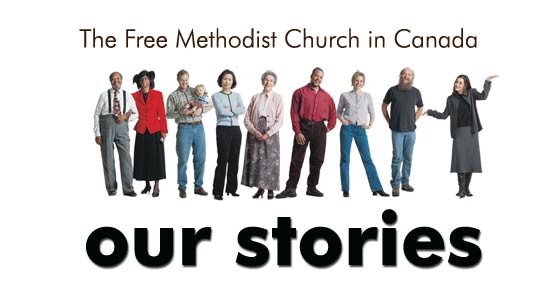I had a great time at the Small and Rural Church workshop at General Conference. It was great to hear about all the great things God is doing in our rural churches. The rural context can be tough, but I thank God there are men and women who have courage enough to face those tough challenges. Churches are still being planted. Churches are still refocusing their energy and redeploying into their communities.
What are the barriers, as a group, we are going to have to push through to see what God has started continue? From what I heard at the workshop one barrier is isolation. This is not a simple problem to overcome. We live in a big country. We have a relatively low population density. Our relative geographic isolation promotes extreme forms of regionalism. As a result our Canadian social fabric strains under the weight of all of this. So what is God's plan? How will he call us out of this darkness and into his marvelous light?
God's plan for us is unity: the sharing of resources, and mutual support. As Methodists we express this part of God's plan in the core value we call Connectionalism (Check it out! It's in The Manual and everything!) Here's part of what it says,
One of our pastors has written, "Methodists are connectional. They do not believe that any one local church has the range of gifts and training to establish doctrine, ordination standards, and other constitutional matters. Instead Methodists do these things collectively, freeing local churches for the work of ministry. They are accountable to their conference for character and conduct and work side-by-side with local church leaders. Independent churches and pastors are not truly Methodist."
If we want to see God-things continue among us, we need to remain connected to one another. Here is some of what we are doing so far to remain connected. I'm sure, together, we can come up with even better ideas!
Our pastors meet in networks to share their personal struggles and triumphs. We have a broad variety of networks to suit all kinds of needs. Some meet according to region, some meet according to life stage, and some meet according to shared goals. Whatever the reason, most pastors find these networks a great way to stay connected.
We meet in General Conferences. These Conferences are where the church meets as a nation, to settle its future and direction together, to see each other face to face, and to hear all the great things God is up to through us.
We meet in Camps. Hanging around Wesley Acres or Arlington Beach is not only a way to get in some good porch time, or take a rip around the lake; it is also a chance to maintain connections and maybe make some new ones.
You're holding it in your hand. Yes, even this award-winning newsletter, we call the "MOSAIC", is designed to keep us all together. We keep you connected with the broader family through stories and write-ups like this one.
We stay in email contact on the pastors and delegates listservs. Read the Bishop's Notes…
Ordination services. Now this one might not seem obvious but if you've ever been to one you'd know what I'm talking about - pastors and lay people all gathered together in one room to celebrate God's call to ministry. It can really be powerful. Don't believe me? Come and see for yourself. I'm being ordained at the Next Church , Sunday, August 14th. If you are not completely satisfied, see me afterward for a full refund.
Connectionalism is vital, but like anything else you only get out of it what you put into it. If you aren't taking advantage of what is already offered… you need to! If you have any ideas on other ways to connect with each other, you should start it! If you are worried that connectionalism may not be a real English word, give us a break. You may have spent too much time in English class!
Jared Siebert is Director of Growth Ministries for The Free Methodist Church in Canada.
skip to main |
skip to sidebar


Links
About The Free Methodist Church in Canada
- Our Ministry Centre is located in
- Mississauga, Ontario, Canada
- The Free Methodist Church is a movement of Christian congregations all across our country that are committed to sharing the good news of faith in Jesus Christ and encouraging believers into a life of ongoing transformation that impacts our families, our communities and our nation.
